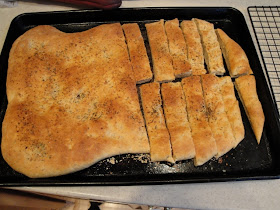Here is a great article written in response to a question sent in by someone who was basically needing to live on storable meals because of the distance to the grocery store. It helps to remind us that frozen and canned fruits and vegetables are healthy and we are perfectly fine feeding our families these items as we rotate our stored food. It helps to make sure that we can prepare them in a manner our families will like and it can save a lot of money in the process that can be put toward other preparedness goals.
Every weekday, a CNNHealth expert doctor answers a viewer question. On Friday, it's Dr. Melina Jampolis, a physician nutrition specialist.
Asked by Nate, Yellowstone National Park
I live in a very remote location: Old Faithful in Yellowstone National Park. I have a hard time buying groceries that are healthy. There is no way I could get to the store even once a week. I end up buying in bulk: frozen (limited space), cans, dry just-add-water type stuff. Any suggestions for better eating?
Expert answer
Hi Nate. I answered a similar question not too long ago from a woman who could not get to the store often due to physical limitations, but I feel that this is so important, particularly with so many nutrition professionals encouraging us to eat fresh fruits, vegetables and meats from the local farmer's market, that it is worth discussing in even more detail.
I don't mean to imply at all that there is anything wrong with eating fresh and local. It is without a doubt incredibly healthy and environmentally friendly. It is just not practical, affordable or even possible for many people in this country like you who still wish to eat as healthy as possible.
Here are a few ideas for bulk frozen, cans, and just-add-water type stuff.
Frozen fruits and veggies are great
As I've mentioned before, they are loaded with nutrients as they are often frozen very quickly after being picked. Just avoid boiling vegetables in water, as this could deplete some of the nutrients. Try microwaving with only a couple of tablespoons of water or steaming.
Frozen fruit could be used to make smoothies (even though it's cold out) by adding protein powder that could be bought in bulk and would not take too much room while adding high-quality protein to your diet.
Cans are OK too
Canned beans are a terrific source of fiber and a good source of protein. Drain the water and rinse the beans to remove a good deal of the sodium. Other canned vegetables such as green beans, tomatoes, corn, peas, carrots, even pumpkin (and more) are good too.
Just try to choose lower-sodium options if possible and drain when you can. Here is a great link for ideas on using canned vegetables. Canned fruit is a healthy, nutrient dense choice too, as long as you choose varieties that are canned in their own juice without added sugar. Finally, canned chicken is a good lean protein option, and canned tuna and salmon packed in water are an economical way to get protein and heart healthy omega 3s twice a week as recommended by the American Heart Association.
Remember nuts, seeds, dried fruit
These can be stockpiled in bulk and provide healthy fat, fiber, vitamins, minerals and phytonutrients, all of which are essential for optimal health. They work great as snacks (or toppings for oatmeal or cereal). Just watch portions sizes (consider pre-portioning out several servings) as they are calorie dense and could lead to weight gain if over-consumed.
Try shelf stable milk
Non-fat dry milk is an option as are shelf-stable milks like almond milk and soy milk. Just make sure to avoid those with added sugar for optimal health.
Whole grains are great
Whole grain pasta, barley, brown rice, oats, and whole grain cereal (make sure the word whole grain is first on the ingredient list when it comes to cereal) can all be bought in bulk, so make sure to stock up on these to get your minimum daily three servings of whole grains.
If you want to add protein to breakfast and can't get to the store to buy eggs, try adding the protein powder I mentioned above to your oatmeal (plus a little extra water) to boost your morning protein intake.
So as you can see, even if you can get to the store only once a month and don't have access to fresh food very often, you can still eat a healthy, balanced diet full of whole grains, a variety of vegetables and fruit, lean protein, healthy fat and low-fat dairy. And if you want to throw in a little dark chocolate for a small after-dinner treat, you'd be following this doctor's orders (even with your shopping limitations) quite well.
http://thechart.blogs.cnn.com/2011/03/18/how-can-i-eat-healthy-if-i-have-to-buy-in-bulk/?hpt=Sbin
































